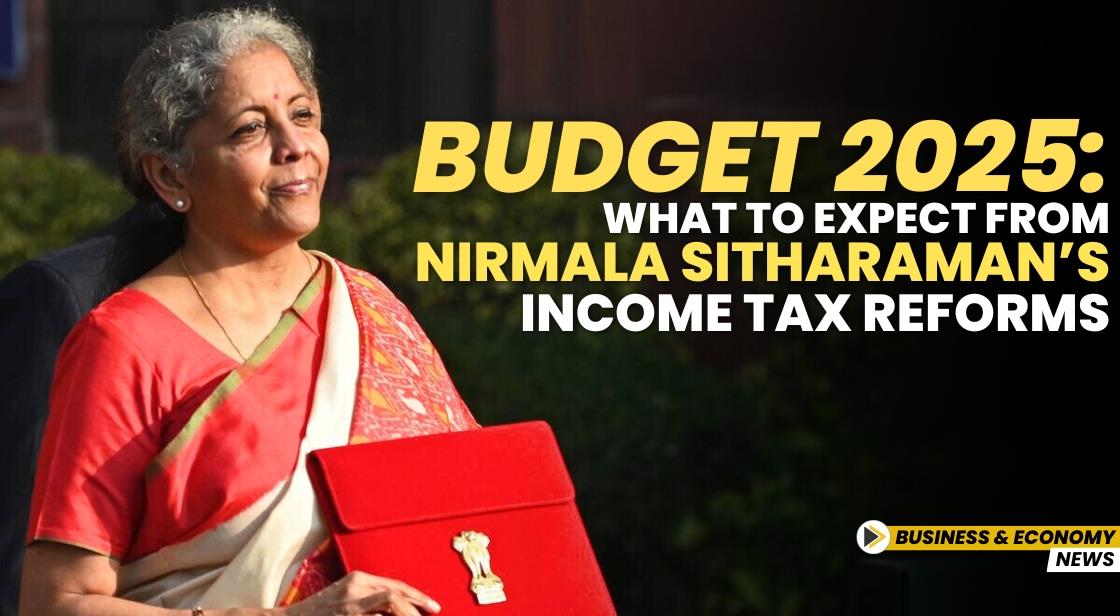Budget 2025: What to Expect from Nirmala Sitharaman’s Income Tax Reforms

News Synopsis
As Budget 2025 draws near, there are growing discussions on potential income tax changes aimed at incentivising the new tax regime. The government, led by Finance Minister Nirmala Sitharaman, is reportedly planning to make the new income tax regime even more attractive by including more benefits.
A key development expected is the potential inclusion of NPS (National Pension Scheme) deductions under the new tax regime, which are currently only available under the old system. This move would likely further encourage taxpayers to opt for the new tax regime, which already offers lower tax rates but fewer exemptions and deductions.
FM Nirmala Sitharaman to Present Budget 2025-26
Union Finance Minister Nirmala Sitharaman is set to present the Budget for the fiscal year 2025-26 in the Lok Sabha on February 1, 2025. According to reports, the government is aiming to make the new tax regime more attractive, thus encouraging more taxpayers to select the system that offers lower tax rates but fewer deductions.
Standard Deduction Limit May Rise Under New Tax Regime
In a bid to enhance the appeal of the new tax regime, the Budget 2025 is expected to increase the standard deduction limit to Rs 1 lakh from the current Rs 75,000. Additionally, there is speculation that the government may reduce income tax rates for individuals earning up to Rs 15 lakh annually. These proposed changes could provide substantial relief to middle-class taxpayers and encourage greater adoption of the new system.
The Shift in Income Tax Regimes
In the previous Budget 2024-25, Finance Minister Sitharaman announced several reforms to make the new tax regime more attractive. These included raising the standard deduction from Rs 50,000 to Rs 75,000 and revising tax slabs, resulting in a Rs 17,500 saving for salaried individuals. The Budget 2024-25 also made the new tax regime the default option, leaving the old regime largely unchanged. The new regime offers a lower rate of tax but eliminates the array of exemptions and deductions available under the old system.
Key Expectations for Budget 2025
Experts are expecting significant changes in Budget 2025 that could further ease the tax burden on individuals, especially in light of inflation and the increasing cost of living. Think tank GTRI has suggested raising the income tax exemption threshold to Rs 5.7 lakh, adjusted for inflation. This recommendation aims to account for the fact that the Rs 2.5 lakh exemption limit for individual taxpayers has remained unchanged since 2014, and its real value has significantly decreased due to inflation.
Income Tax Rates: A Comparison of New vs. Old Regimes
The new tax regime offers lower tax rates but fewer deductions, and its current structure exempts income up to Rs 3 lakh. Individuals earning between Rs 3-7 lakh pay 5%, those earning between Rs 7-10 lakh pay 10%, those with income from Rs 10-12 lakh pay 15%, and so on, with income above Rs 15 lakh taxed at 30%.
In contrast, the old regime exempts income up to Rs 2.5 lakh, with progressively higher rates of 5%, 20%, and 30% depending on income levels. Under the old system, taxpayers can also claim a wide range of exemptions and deductions, including for investments, home loans, and insurance premiums.
Proposed Reforms for 2025: Addressing Inflation and Tax Burden
In addition to raising the income tax exemption threshold, GTRI has called for a simplification of the TDS system and equal treatment of tax on bank deposits and equities. It has also recommended raising fixed deductions and exemptions to account for inflation. For example, the Rs 10,000 deduction for savings deposit interest, set in 2013, is now worth only Rs 5,000 and should be raised to Rs 19,450 by 2025. Similarly, the Rs 1.5 lakh deduction for life insurance premiums, provident fund contributions, and superannuation funds should be adjusted to Rs 2.6 lakh to maintain its real value.
Conclusion: Anticipating Major Tax Reforms in Budget 2025
As the government prepares to unveil the Budget 2025-26, it is clear that significant changes to income tax policies are on the horizon. With potential revisions to the new tax regime, the inclusion of more deductions, and measures to address inflation, Budget 2025 could provide substantial relief to individuals, particularly those in the middle-income bracket. These changes would not only enhance the attractiveness of the new tax system but also reflect the government's commitment to ensuring a fair and modern tax regime for the country's taxpayers.
You May Like









